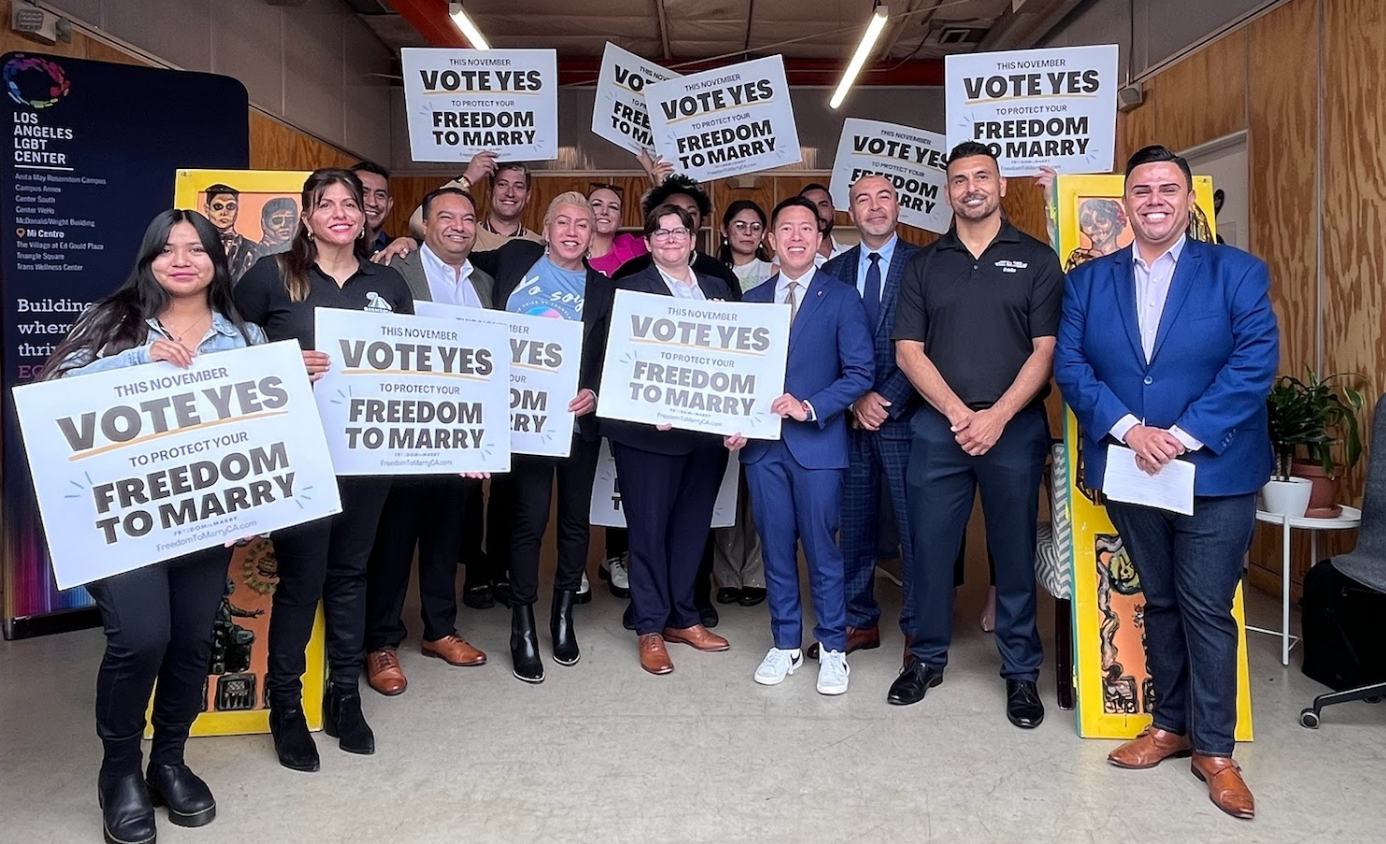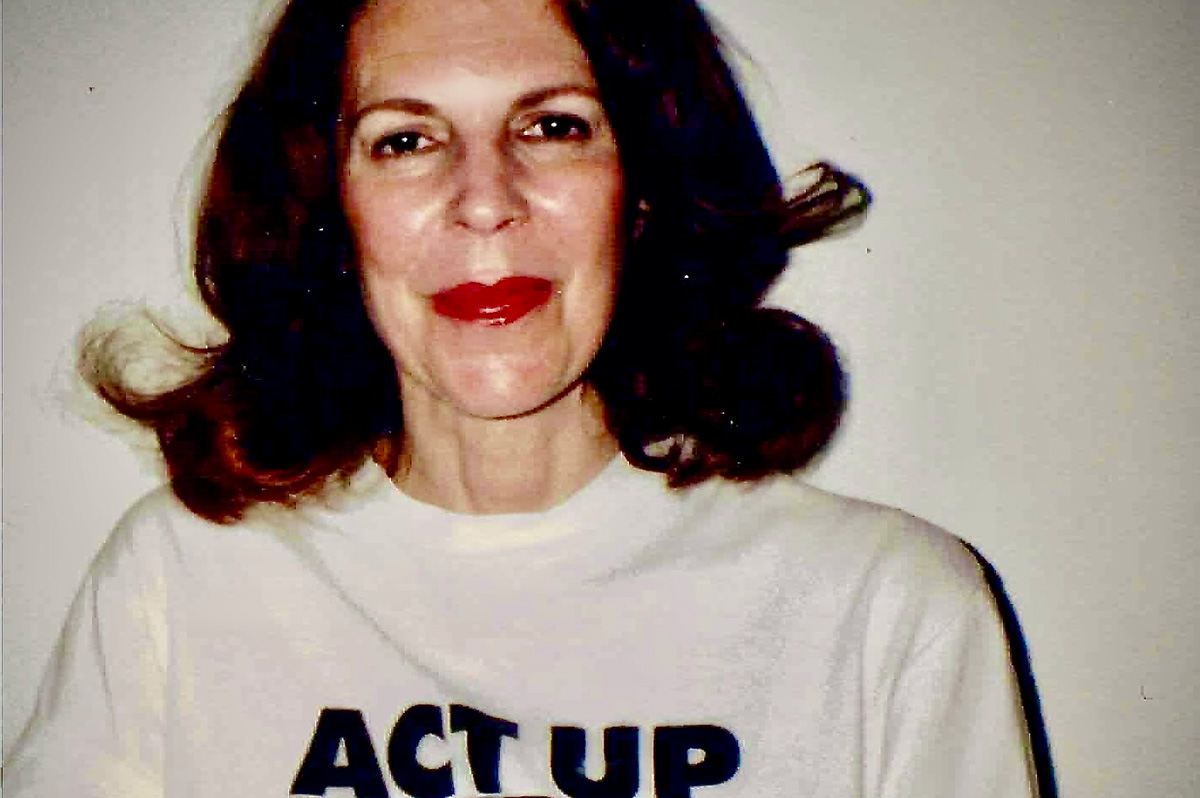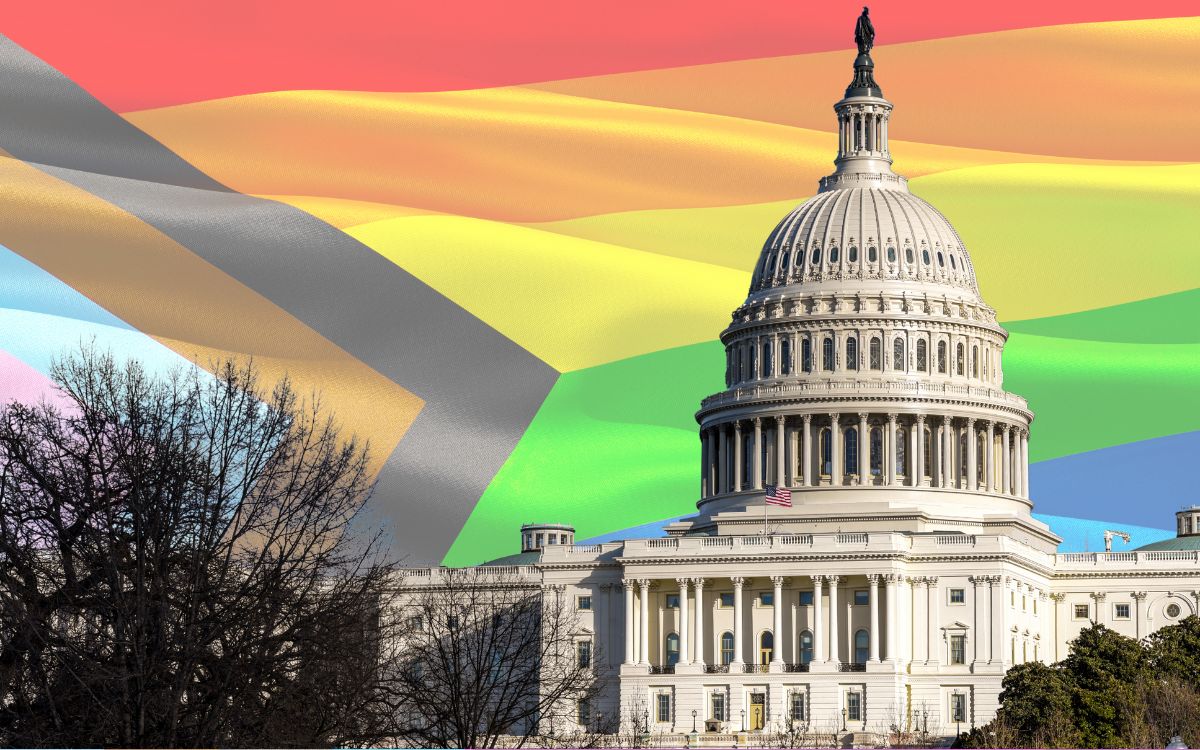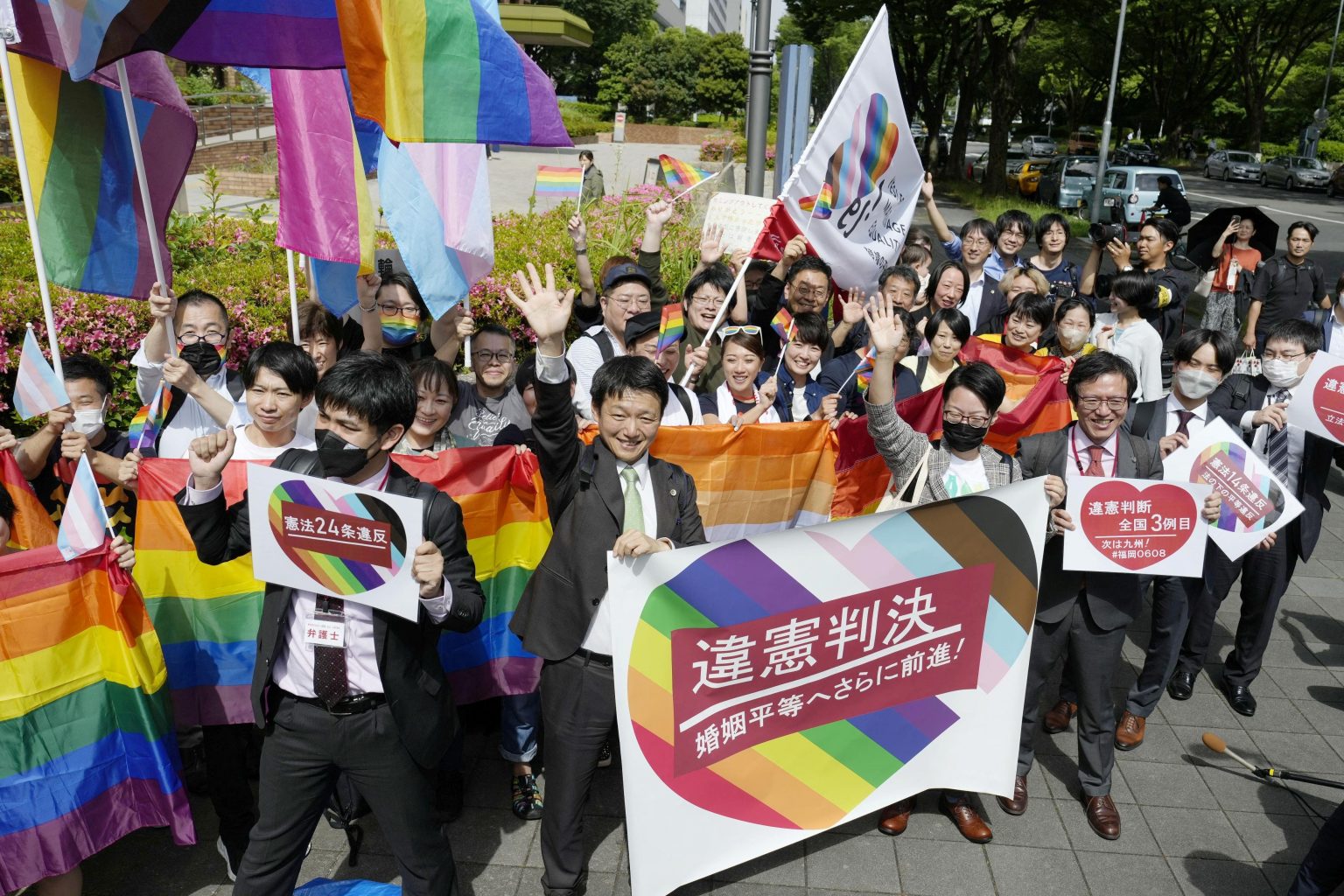News
California Constitution to recognize same-sex and interracial marriage as fundamental right
Proposition 3 passes with an overwhelming majority

Proposition 3 passes with an overwhelming vote on Tuesday night, enshrining the right to marry into the California Constitution once and for all.
This win for LGBTQ+ and BIPOC communities in California, comes after a night of tight races in battleground states across the nation that overwhelmingly favored Republican candidate Donald Trump.
“With the current makeup of the Supreme Court, there is no guarantee that the precedent set by Obergefell almost ten years ago will hold,” said Equality California’s Executive Director Tony Houang. “If the Supreme Court can overturn almost fifty years of precedent—as they did with Roe v. Wade—we cannot assume it will uphold a decision protecting marriage equality for same-sex couples not even a decade old.”
Proposition 3 will now amend the California Constitution to recognize the fundamental right to marry, regardless of gender or ethnicity.
Previously, Prop 8 was passed in 2008 and a new section that states that only marriages between a man and a woman would be recognized in the state, was added to the California Constitution.
The day after the election, three lawsuits were filed against the decision and the Supreme Court decided to hear the cases, ultimately ruling that the proposition was unconstitutional.
Though it was struck down in 2013, the language remained on the California Constitution that only names men and women as valid partners in a marriage—until now.
Votes are still being counted for the presidential election, though the Senate will now be Republican-led.
Proposition 36 also passed with an overwhelming majority, now allowing felony charges for petty crime including theft and drug possession.
Obituary
Nanette Kazaoka, an unlikely AIDS activist, dies at 83
Member of ACT-UP, longtime social justice advocate

Nanette Kazaoka, a well-known figure in the fight for HIV/AIDS awareness and the rights of marginalized communities, passed away on Oct. 2 at her home in New York City. She was 83. The cause of death was complications from vascular dementia and Alzheimer’s disease, according to a statement from her daughter Kelly Kochendorfer.
Kazaoka was an advocate for justice, particularly in the early days of the AIDS crisis, when she became a member of the AIDS Coalition to Unleash Power, or ACT-Up. She is perhaps best remembered for her participation in a 2004 protest in front of Madison Square Garden during the Republican National Convention, when she and 11 fellow activists staged a dramatic naked demonstration, demanding debt cancellation for impoverished countries, according to a statement from the family.
“Bush, Stop AIDS. Drop the Debt Now!” they chanted, with slogans stenciled in black paint on their bodies. The bold protest drew national attention and underscored the urgency of global debt relief as a key element in the fight against AIDS.
She was born Nanette Natalina Bottinelli on June 12, 1941, in New York City. Her father, Angelo, worked as a waiter at the St. Regis Hotel, while her mother, Betty McComb, was a part-time burlesque dancer.
She married her first husband, Fred Kochendorfer, in 1963, and they had two children together, Kim Skrobe and Kelly, both of whom survive her.
Kazaoka’s journey to Fire Island marked a transformative period in her life. Kochendorfer wanted to live there, and so they began renting in 1967. Kazaoka then made a bold decision that would shape her future: She left her husband for another man and began living on Fire Island in 1968-1969, with the children attending school in Ocean Beach, according to the family’s statement.
This period coincided with the early days of the gay rights movement, as Fire Island was emerging as a hub for LGBTQ culture. Her experiences during these years contributed to the strong sense of activism and solidarity that would later define her role in ACT-UP and the broader fight for LGBTQ rights.
Kazaoka’s second husband, Katsushiga “Kats” Kazaoka, a Japanese-American psychologist who had been interred during World War II, died of cancer in 1984, pushing her to enter the workforce as a receptionist while studying occupational therapy at Downstate Medical Center. By 1990, she had earned her degree and sought work with AIDS patients.
In 1988, a close friend introduced her to ACT-UP, sparking the start of her full-time dedication to AIDS activism, the family said. Kazaoka became known for her passionate, unrelenting activism, whether protesting at City Hall or challenging anti-LGBTQ policies at St. Luke’s Hospital.
Kazaoka’s activism spanned 35 years, making her a beloved and respected figure within ACT-UP and beyond, the family noted. She was featured in Sarah Schulman’s “Let the Record Show: A Political History of ACT-Up New York, 1987-1993” as well as “Act-Up Oral History, No. 162,” a digital history. She was the cover photo of “Fag Hags, Divas and Moms: The Legacy of Straight Women in the AIDS Community,” and was included in The New York Times T Living Magazine story, “LEGENDS PIONEERS AND SURVIVORS.
Her dedication to science continued even after her passing: She donated her brain to the Mount Sinai NIH Brain and Tissue Repository for research to advance the understanding of the human brain health and disease to help end dementia, the family said.
Along with her daughters, Kazaoka is survived by her son-in-law John Skrobe, granddaughter Stella Skrobe and daughter-in-law Christine Arax, all of New York. She and her third husband, Paul Haskell, divorced in 2000.

News
Here are 3 events to celebrate Trans Day of Visibility
Today marks the first day in the 2025 Trans Week of Visibility

Finding the right event to celebrate in community or just gather in a safe space can be challenging, so we put together a list of SoCal events happening during Trans Week of Visibility. The week-long list of events will lead up to Trans Day of Visibility, a day meant to bring trans issues, perspectives and experiences at the forefront, celebrate progress and unite against the erasure of trans lives.
This year, TDOV is particularly important to the LGBTQ+ community because of the ongoing attacks against rights, freedoms and protections. Major news outlets like The New York Times have continued to platform cisgender people speaking on trans rights and have left trans people out of the conversation.
A report by Media Matters and GLAAD finds that The NY Times “excluded the perspectives of trans people from two-thirds of its stories about anti-trans legislation in the year following public criticism for its handling of the topic.”
Dawn Ennis, Washington Blade reporter and professor at Hartford University, wrote an article in 2019 regarding the ongoing epidemic declared by the American Medical Association, which disproportionately affects Black, trans women.
Since then, each year has been a record-breaking year for the amount of proposed and passed legislation targeting trans rights. The Trans Legislation Tracker is currently tracking 725 active bills across 49 states. That marks yet another record-breaking year in the ongoing political attacks toward the trans community.
(more…)India
LGBTQ+ poets included in India’s premier literary festival
Sahitya Akademi seen as mirror of government’s cultural agenda

India’s premier literary institution on March 7 announced it would allow LGBTQ+ poets to participate in its marquee Festival of Letters in New Delhi.
The Sahitya Akademi, often seen as a mirror of the government’s cultural agenda, for the first time allowed these poets into a high-profile poetry reading at the Rabindra Bhavan. They shared the stage with more than 700 writers across 50 languages.
Culture and Tourism Minister Gajendra Singh Shekhawat kicked off the Festival of Letters with Mahesh Dattani, the acclaimed English-language playwright famed for his provocative works, as the main guest. Dubbed Asia’s grandest literary gathering, the Sahitya Akademi took place over six days under the “Indian Literary Traditions” theme.
The 2025 Festival of Letters showcased a sweeping range of voices — young writers, women writers, Dalit authors from marginalized castes, Northeast Indian scribes, tribal poets, and LGBTQ+ poets — cementing its reputation as a literary kaleidoscope.
Kalki Subramaniam, a leading transgender rights activist and author, on March 9 chaired a literary session titled “Discussion on Literary Works of LGBTQ Writers in the 21st Century,” which spotlighted contemporary queer voices.
“It was enriching to listen to the profound thoughts of LGBT writers from various parts of the country in their speeches,” said Subramaniam. “The session was particularly memorable with the participation of A. Revathi Amma from Tamil Nadu, Reshma Prasad from Bihar, Sanjana Simon from New Delhi, and Devika Devendra Manglamukhi and Shivin from Uttar Pradesh and Aksaya K Rath from Orissa.”
Subramaniam discussed how global politics shape gender rights and the persistent erasure of trans identity, urging a unified push for solidarity within the LGBTQ+ community. She stressed the vital need to elevate queer works and writers, casting their voices as essential to the literary vanguard.
“It was a pleasure to meet great writers from around the country in the festival as well as meet my writer activist friends Sajana Simon and Revathi Amma after a long time,” said Subramaniam.

The government on March 12, 1954, formally established the Sahitya Akademi. A government resolution outlined its mission as a national entity tasked with advancing Indian literature and upholding rigorous literary standards; a mandate it has pursued for seven decades.
The Sahitya Akademi in 2018 broke ground in Kolkata, hosting the country’s first exclusive gathering of trans writers, a landmark nod to queer voices in Indian literature.
Hoshang Dinshaw Merchant, India’s pioneering openly gay poet and a leading voice in the nation’s gay liberation movement, on March 9 recited a poem at the Festival of Letters, his verses carrying the weight of his decades-long quest for queer recognition. He later thanked the session’s chair for welcoming the community, a gesture that underscored the event’s third day embrace of diverse voices.
The Sahitya Akademi in 2024 honored K. Vaishali with the Yuva Puraskar for her memoir “Homeless: Growing Up Lesbian and Dyslexic in India,” a raw account of navigating queerness and neurodivergence. Vaishali in a post-win interview reflected on India’s deep-seated conservatism around sexuality, noting she wrote from a place of relative safety — an upper-caste privilege that shielded her as she bared her truth. The award, she said, was the Akademi’s indelible seal on her lived experience, a validation no one could challenge.
The Sahitya Akademi’s inclusion of LGBTQ+ writers in its main program this year jars with the Bharatiya Janata Party-led government’s conservative stance, which, in 2023, opposed same-sex marriage in the Supreme Court, arguing it erodes Indian family values. Yet, under Shekhawat, the Sahitya Akademi’s spotlight on queer voices at the Rabindra Bhavan suggests it could be a tentative crack in a regime typically rooted in tradition.
The Festival of Letters hosted a translators’ meeting on March 10, spotlighting P. Vimala’s 2024 award-winning Tamil translation of Nalini Jameela’s “Autobiography of a Sex Worker,” a work steeped in marginalized voices that include queer perspectives.
This platform gained significant support from the BJP-led government, with Shekhawat securing a 15 percent budget increase to ₹47 crore ($5.63 million) in 2024. In Tamil Nadu state, however, Dravida Munnetra Kazhagam’s Chief Minister Muthuvel Karunanidhi Stalin, has long opposed such cross-linguistic efforts, fearing dilution of Tamil identity amid decades of anti-Hindi sentiment — a tension the Sahitya Akademi’s inclusive showcase sought to bypass.
‘The Akademi is very inclusive and has a friendly festival ambience,” Subramaniam told the Los Angeles Blade.
California
Equality California to release 2024 Legislative Scorecard and rally at State Capitol
The rally will unite LGBTQ+ community members and political leaders

Equality California will hold a rally at the State Capitol’s West Steps in response to rising anti-LGBTQ+ political attacks on Wednesday, March 26 at 11:00 AM PT.
This rally will also serve as an opportunity to discuss the release of the 2024 Legislative Scorecard, which is a report of politicians and sponsored legislation that further and cement the protections of LGBTQ+ rights. The scorecard also analyzes voting methods and results, gathering an overall score that reflects legislators’ votes on EQCA-sponsored legislation.
Equality California is the nation’s largest statewide civil rights organization working towards bringing justice to LGBTQ+ issues by rallying against legislative issues that attack LGBTQ+ rights.
This call to action will serve as part of the organization’s annual LGBTQ+ Advocacy Day, held each year to bring together constituents with lawmakers in support of pro-LGBTQ+ legislation.
EQCA has a line-up of featured political speakers to include Assembly Democratic Caucus Chair Rick Chavez Zbur, Legislative LGBTQ Caucus Chair and Assemblymember Chris Ward, Legislative LGBTQ Caucus Vice Chair and Senator Caroline Menjivar, among others.
This event is meant to bring attention to the rise in political attacks, unite in community and mobilize efforts toward preserving LGBTQ+ rights for the state of California and beyond.
Japan
Japan’s marriage equality movement gains steam
Nagoya High Court this month ruled lack of legal recognition is unconstitutional

Japan’s Nagoya High Court on March 7 ruled the lack of legal recognition of same-sex marriages violates the country’s constitution.
The plaintiffs argued Japan’s Civil Code and Family Registration Act, which does not recognize same-sex marriages, violates the country’s constitution. They cited Article 14, Paragraph 1, which guarantees equality under the law and prohibits discrimination based on factors that include race, creed, sex, or social status. The plaintiff also invoked Article 24, Paragraph 2, which emphasizes that laws governing marriage and family matters must uphold individual dignity and the fundamental equality of the sexes.
The plaintiffs sought damages of 1 million yen ($6,721.80) under Article 1, Paragraph 1, of the State Redress Act, which provides for compensation when a public official, through intentional or negligent acts in the course of their duties, causes harm to another individual. The claim centered on the government’s failure to enact necessary legislation, which prevented the plaintiff from marrying.
The court noted same-sex relationships have existed naturally long before the establishment of legal marriage. It emphasized that recognizing such relationships as legitimate is a fundamental legal interest connected to personal dignity, transcending the confines of traditional legal frameworks governing marriage and family.
The court further observed same-sex couples encounter significant disadvantages in various aspects of social life that cannot be addressed through civil partnership systems. These include housing challenges, such as restrictions on renting properties, and financial institutions refusing to recognize same-sex couples as family members for mortgages. Same-sex couples also face hurdles in accessing products and services tailored to family relationships. While the court deemed the relevant provisions unconstitutional, it clarified that the government’s failure to enact legislative changes does not constitute a violation under the State Redress Act.
The lawsuit, titled “Freedom of Marriage for All,” brought together a large coalition of professionals, including more than 30 plaintiffs and 80 lawyers. They filed six lawsuits in five courts throughout Japan.
“We filed these lawsuits on Valentine’s Day, Feb. 14, 2019, in Tokyo, Osaka, Nagoya, and Sapporo, and in September of that year in Fukuoka,” noted Takeharu Kato, director of Marriage for All Japan. “Then, in March 2021, the Sapporo District Court handed down the first ruling declaring the current laws unconstitutional, which received extensive worldwide media coverage. Subsequently, the Osaka District Court unfortunately ruled that the current law is constitutional, but among the 10 rulings handed down so far, nine have ruled that not recognizing marriage equality is unconstitutional.”
Kato is a lawyer who is part of the legal team in the Sapporo case. He is also a board member of Marriage for All Japan, a marriage equality campaign.
“The MFAJ (Marriage for All Japan) is fully supporting the lawsuits by publicizing the current status of the trials and the rulings in our websites and social networks, setting up press conferences at the time of the rulings,” Kato told the Los Angeles Blade. “We also make the best of the impact of the lawsuits in our campaign by holding events with the plaintiffs of the lawsuits and inviting them to the rally at Diet (the Japanese parliament) members’ building.”
Kato said the campaign has significantly shifted public opinion, with recent polls indicating more than 70 percent of Japanese people now support marriage equality — up from approximately 40 percent before Marriage for All Japan launched. He also noted 49 percent of Diet members now back marriage equality.
Japan is the only G7 country that does not legally recognize same-sex couples. Taiwan, Nepal, and Thailand have extended full marriage rights to gays and lesbians.
Expressing disappointment, Kato said many Japanese politicians continue to resist marriage equality, despite overwhelming public support. Kato added Marriage for All Japan expects the Supreme Court to rule on their lawsuits in 2016.
“We believe that the Supreme Court will also rule that the current laws are unconstitutional,” he said. “However, the Supreme Court’s ruling alone is not enough to achieve marriage equality under the Japanese legal system. We should put more and more strong pressure on the Diet to legalize marriage equality in Japan as soon as possible.”
Several municipalities and prefectures issue certificates that provide limited benefits to same-sex couples, but they fall short of equal legal recognition.
Prime Minister Fumio Kishida’s government has faced mounting pressure on the issue as public support for marriage equality has surged in recent years. Kishida has yet to push reforms within his own party; encountering fierce opposition from its traditional leadership.
His government in June 2023 passed Japan’s first law addressing sexual orientation and gender identity, aiming to “promote understanding” and prevent “unfair discrimination.” Activists, however, widely criticized the legislation on grounds it fails to provide comprehensive protections or extend marriage rights to same-sex couples.
National
LGBTQ+ asylum seeker ‘forcibly removed’ from US, sent to El Salvador
Immigrant Defenders Law Center represents Venezuelan national

An immigrant rights group that represents an LGBTQ+ asylum seeker from Venezuela says the Trump-Vance administration on March 15 “forcibly removed” him from the U.S. and sent him to El Salvador.
Immigrant Defenders Law Center Litigation and Advocacy Director Alvaro M. Huerta during a telephone interview with the Los Angeles Blade on Tuesday said officials with U.S. Immigration and Customs Enforcement and U.S. Customs and Border Protection alleged his organization’s client was a member of Tren de Aragua, a Venezuela-based gang, because of his tattoos and no other information.
“It’s very flimsy,” said Huerta. “These are the types of tattoos that any artist in New York City or Los Angeles would have. It’s nothing that makes him a gang member.”
The White House on Feb. 20 designated Tren de Aragua an “international terrorist organization.”
President Donald Trump on March 15 invoked the Alien Enemies Act of 1798, which the Associated Press notes allows the U.S. to deport “noncitizens without any legal recourse.”
“I proclaim that all Venezuelan citizens 14 years of age or older who are members of TdA (Tren de Aragua), are within the United States, and are not actually naturalized or lawful permanent residents of the United States are liable to be apprehended, restrained, secured, and removed as alien enemies,” said Trump in a proclamation that announced his invocation of the 18th century law.
The asylum seeker — who the Immigrant Defenders Law Center has not identified by name because he is “in danger” — is among the hundreds of Venezuelans who the U.S. sent to El Salvador on March 15.
Chief Judge James E. Boasberg of the U.S. District Court for the District of Columbia temporarily blocked the deportations. The AP notes the flights were already in the air when Boasberg issued his ruling.
Huerta said U.S. officials on Monday confirmed the asylum seeker is “indeed in El Salvador.” He told the Blade it remains unclear whether the asylum seeker is in the country’s Terrorism Confinement Center, a maximum-security prison known by the Spanish acronym CECOT.
‘We couldn’t find him’
Huerta said the Immigrant Defenders Law Center client fled Venezuela and asked for asylum in the U.S.
The asylum seeker, according to Huerta, passed a “credible fear interview” that determines whether an asylum claim is valid. Huerta said U.S. officials detained the asylum seeker last year when he returned to the country from the Mexican border city of Tijuana.
Huerta told the Blade the asylum seeker was supposed to appear before an immigration judge on March 13.
“We couldn’t find him,” said Huerta.
He noted speculation over whether Trump was about to invoke the Alien Enemies Act, and the Immigrant Defenders Law Center “started getting concerned that maybe he was caught up in this situation.”
“He’s an LGBT individual who is an artist in Venezuela,” said Huerta.
Neither ICE nor CBP have responded to the Blade’s request for comment.
Huerta said it is “hard to say” whether the asylum seeker has any legal recourse.
“He still has an ongoing case in immigration court here,” said Huerta, noting the asylum seeker’s attorney was in court on Monday, and has another hearing in two weeks. “Presumably they should have to allow him to appear, at least virtually, for court because he still has these cases.”
Huerta noted the U.S. since Trump took office has deported hundreds of migrants to Panama; officials in the Central American country have released dozens of them from detention. Migrants sent to the Guantánamo Bay naval base in Cuba have returned to detention facilities in the U.S.
“Something where the government, kind of unliterally, can just say that someone is a gang member based on tattoos, without any offer of proof, without having to go to court to say that and then take them externally to what effectively a prison state (El Salvador), it certainly is completely just different than what we’ve seen,” Huerta told the Blade.
Huerta also spoke about the Trump-Vance administration’s overall immigration policy.
“The Trump administration knows exactly what they’re doing when it comes to scapegoating immigrants, scapegoating asylees,” he said. “They have a population that, in many ways, is politically powerless, but in many other ways, is politically powerful because they have other folks standing behind them as well, but they’re an easy punching bag.”
“They can use this specter of we’re just deporting criminals, even though they’re the ones who are saying that they’re criminal, they’re not necessarily proving that,” added Huerta. “They feel like they can really take that fight and run with it, and they’re testing the bounds of what they can get away with inside and outside of the courtroom.”
National
Trump administration considering closing HIV prevention agency: reports
Sources say funding cuts possible for CDC

The Department of Health and Human Services is considering closing the HIV Prevention Division of the U.S. Centers for Disease Control and Prevention and transferring some of its programs to a different agency, according to a report by the New York Times.
The Times and Politico cited government sources who spoke on condition of not being identified as saying plans under consideration from the administration also call for possible funding cuts in the domestic HIV prevention program following funding cuts already put in place for foreign U.S. HIV programs.
“It’s not 100 percent going to happen, but 100 percent being discussed,” the Times quoted one of the sources as saying.
News of the possible shutdown of the HIV Prevention Division and possible cuts in HIV prevention funds prompted 13 of the nation’s leading LGBTQ, HIV, and health organizations to release a joint statement on March19 condemning what they said could result in a “devastating effect” on the nation’s progress in fighting AIDS.
Among the organizations signing on to the joint statement were D.C.’s Whitman-Walker Health and the Los Angeles LGBT Center.
Carl Schmid, executive director of the HIV + Hepatitis Policy Institute, which opposes funding cuts or curtailment in domestic AIDS programs, points out in a separate statement that it was President Trump during his first term in office who put in place the HIV Epidemic Initiative, which calls for ending the HIV epidemic in the U.S. by 2030.
That initiative, which Trump announced in his 2019 State of the Union address, is credited with having reduced new HIV infections nationwide by 30 percent in adolescents and young adults, and by about 10 percent in most other groups, according to the Times report on possible plans to scale back the program.
In a statement released to Politico, HHS spokesperson Andrew Nixon said, “HHS is following the Administration’s guidance and taking a careful look at all divisions to see where there is overlap that could be streamlined to support the President’s broader efforts to restructure the federal government.”
“No final decision on streamlining CDC’s HIV Prevention Division has been made,” Nixon said in his statement.
“An effort to defund HIV prevention by this administration would set us back decades, cost innocent people their lives and cost taxpayers millions,” said Kelley Robinson, president of the Human Rights Campaign, the nation’s largest LGBTQ advocacy organization, in a March 19 statement.
“The LGBTQ+ community still carries the scars of the government negligence and mass death of the HIV/AIDS epidemic,” Robinson said. “We should be doubling down on our investment to end the HIV epidemic once and for all, not regressing to the days of funeral services and a virus running rampant,” she said.
“We are outraged and deeply alarmed by the Trump administration’s reckless moves to defund and de-prioritize HIV prevention,” the statement released by the 13 organizations says. “These abrupt and incomprehensible possible cuts threaten to reverse decades of progress, exposing our nation to a resurgence of a preventable disease with devastating and avoidable human and financial costs,” the statement says.
Breaking News
Family of Linda Becerra Moran, trans woman killed by LAPD after calling 911, files lawsuit
Moran was pronounced dead after three weeks on life-support

On Feb. 7, Linda Becerra Moran contacted the Los Angeles Police Department in a phone call where she reported that she was being held against her will in a San Fernando Motel.
At around 9:40AM, Moran called the Foothill Division of the LAPD, and was recorded stating that she was not only being held at the motel against her will, but that she was being forced to bring men into her motel room. In the audio call recording, she is heard crying as she answers the questions regarding her safety.
When the officers found her in the hotel room they stated that she didn’t remember how she got there, while speaking in Spanish to the officers.
The statement released regarding the officer-involved shooting says that ‘when officers arrived, they entered the motel room and met with Moran. During their investigation, Moran became agitated, armed herself with a knife and held it to her neck.’
The officers responded by drawing their guns, further agitating her. The attorney representing the family of Moran says the released video proves that the shooting was unlawful and unjust.
Now, the TransLatin@ Coalition is looking for justice for Moran and her family, especially considering that she was someone who received services directly from them. They hosted the first vigil for her on Friday, March 14, in front of the LAPD headquarters.
“Linda Becerra Moran, a trans immigrant who received services from our organization, was brutally shot and murdered by the Los Angeles Police Department. We held a vigil and we invited the community to join us in solidarity as we demand justice and honor Linda’s life,” said the TransLatin@ Coalition in a statement.
The police officer who shot and killed Moran was Jacob Sanchez, 24, who was hired in 2021.
Moran was pronounced dead after three weeks on life support in late February.
Somos Familia Valle, is hosting a poster-making event today from 2PM to 8PM where they will be preparing for a call to action. The call to action is scheduled for Saturday, March 22 at the Foothill Division Police Department, at 1PM. The organization posted a list of demands, along with their statement on Moran’s death.
“At a time where our trans siblings are being attacked politically and socially, now more than ever is the time for us to be loud and seek accountability,” reads the statement. “The murder of Linda Becerra Moran by the Los Angeles Foothill Division Police Department was unwarranted and speaks to the disregard for trans lives, but also the lack of de-escalation tactics.”
Chile
2024 was ‘year of regression’ for LGBTQ+ rights in Chile
Advocacy group blamed rise in ultra-right, government inaction

A report that a Chilean advocacy group released on Tuesday says 2024 was a “year of regression” for LGBTQ+ rights.
The Movement for Homosexual Integration and Liberation (Movilh)’s 23rd Sexual and Gender Diversity Human Rights report notes LGBTQ+ rights for the first time since democracy returned to Chile in 1990 not only stopped advancing, but saw significant rollbacks in the three branches of government.
The Movilh report describes 2024 as “the year of regression,” noting 23.5 percent of human rights violations against LGBTQ+ people over the last two decades occurred last year. A total of 2,847 discrimination complaints were reported in 2024, representing a 78.7 percent increase over the previous year.
The report documents two murders, 44 physical or verbal assaults, two incidents of violence in police stations, 89 reports of abuse in the workplace, and 65 incidents in educational institutions in 2024. The transgender community was particularly affected, with a 462.6 percent increase in discrimination cases compared to 2023.
The Movilh report notes the growing influence of the ultra-right, whose narratives have fostered hate speech, is one of the main factors behind the deterioration of LGBTQ+ rights in Chile. The advocacy group also criticizes authorities who have remained silent in the face of these attacks, even though they say they support the LGBTQ+ community.
The report specifically singles out the Executive Branch.
Movilh specifically highlights the prohibition of public funds for hormone treatments for trans minors and the postponement of these procedures in public hospitals. The government reversed course after intense pressure and judicial appeals.
The report also criticizes the judiciary.
The Oral Criminal Trial Court of San Antonio refused to classify the murder of a trans woman as a femicide, arguing her identity card still reflected the gender assigned to her at birth. The Court of Appeals of Santiago also ordered the removal of a homophobia complaint on social media, setting what NGOs have described as a dangerous freedom of speech precedent.

The report notes Valparaíso, Metropolitana, and Biobío are the three regions with the highest number of discrimination complaints, with 51.3 percent, 25.1 percent, and 5.8 percent respectively. Reported cases increased in 11 of Chile’s 16 regions, with Ñuble leading the way with a 300 percent increase.
Faced with this bleak panorama, advocacy groups have intensified their efforts to denounce the violence and demand LGBTQ+ rights are once again guaranteed. Movilh, along with other organizations, have approached the Inter-American Commission on Human Rights and the U.N. about the situation in Chile.
“We are seeing a reversal of rights that cost decades of struggle,” warns the report. “If the State does not act urgently, we run the risk of discrimination and violence becoming institutionalized.”
U.S. Federal Courts
Federal judge blocks Trump’s trans military ban
Cites ‘cruel irony’ of fighting for rights they don’t enjoy

A federal judge in D.C. on Tuesday blocked President Donald Trump’s ban on transgender service members, which was scheduled to take effect on Friday.
U.S. District Judge Ana Reyes issued the preliminary injunction, saying the policy violates the Constitution.
“Indeed, the cruel irony is that thousands of transgender service members have sacrificed — some risking their lives — to ensure for others the very equal protection rights the military ban seeks to deny them,” Reyes wrote.
The legal challenge to Trump’s trans military ban executive, Talbott v. Trump, was brought by LGBTQ groups GLAD Law and National Center for Lesbian Rights.
Reyes found that the ban violates equal protection because it discriminates based on trans status and sex and because “it is soaked in animus,” noting that its language is “unabashedly demeaning, its policy stigmatizes transgender persons as inherently unfit, and its conclusions bear no relation to fact.”
The lead attorneys in the case are GLAD Law Senior Director of Transgender and Queer Rights Jennifer Levi and NCLR Legal Director Shannon Minter.
“Today’s decisive ruling speaks volumes,” said Levi. “The court’s unambiguous factual findings lay bare how this ban specifically targets and undermines our courageous service members who have committed themselves to defending our nation. Given the court’s clear-eyed assessment, we are confident this ruling will stand strong on appeal.”
Nicolas Talbott, a second lieutenant in the Army Reserves, and Erica Vandal, a major in the U.S. Army, are two of the 14 plaintiffs in the case. They spoke during a virtual press conference with Levi and Minter on Wednesday.
“Yesterday’s ruling is just such a tremendous step forward for transgender service members,” said Talbott.
Vandal added the ruling “clearly recognizes that transgender soldiers, sailors, airmen, and Marines have been serving openly as our authentic selves for nearly a decade in every capacity, at every echelon, in every theater and combat zone across the world, all while meeting and exceeding the same standards as every one else without causing any degradation or unit cohesion.”
Levi said Reyes’s ruling requires “the military to return to business as usual.”
The decision is stayed until 10 a.m. on Thursday. It is not immediately clear whether the Trump-Vance administration will challenge it.
“What the order does is stave off, put off any effect of the ban actually being implemented against any individuals,” said Levi.
-

 History5 days ago
History5 days agoLos Angeles Blade celebrates 8 years!
-

 Obituary21 hours ago
Obituary21 hours agoNanette Kazaoka, an unlikely AIDS activist, dies at 83
-

 Arts & Entertainment5 days ago
Arts & Entertainment5 days agoBillboard’s Women in Music ticket giveaway announcement
-

 News3 days ago
News3 days agoHere are 3 events to celebrate Trans Day of Visibility
-

 Autos5 days ago
Autos5 days agoGreen machines on the scene
-

 Arts & Entertainment4 days ago
Arts & Entertainment4 days agoWin your tickets to Margaret Cho at The Grammy Museum for one rare night!
-

 India4 days ago
India4 days agoLGBTQ+ poets included in India’s premier literary festival
-

 Television2 days ago
Television2 days agoNo, ‘Mid-Century Modern’ is not a ‘Golden Girls’ remake
